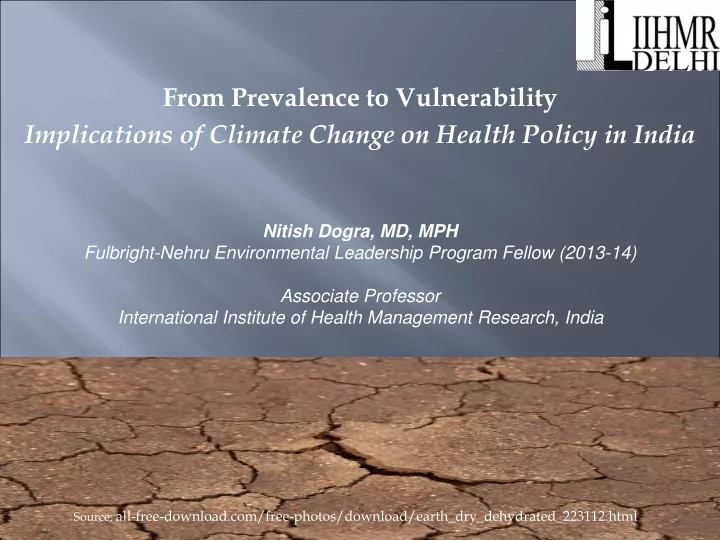

From Prevalence to Vulnerability Implications of Climate Change on Health Policy in India Nitish Dogra, MD, MPH Fulbright-Nehru Environmental Leadership Program Fellow (2013-14) Associate Professor International Institute of Health Management Research, India Source: all-free-download.com/free-photos/download/earth_dry_dehydrated_223112.html
Vulnerability Indices Case Studies at District Level Implications for the Real World Source: all-free-download.com/free-photos/download/earth_dry_dehydrated_223112.html
Vulnerability ∫Exposure, Sensitivity and Adaptive Capacity Source: IPCC
Elements of Vulnerability Climate Drivers Increased exposure Exposure Pathways Reduced Increased Adaptive sensitivity Capacity Health Impacts Poor access to care and preventive services Health Outcomes/Burden Source: Courtesy Dr. John Balbus, NIH
\ Source: Saravask, based on work by Planemad and Nichalp
Guidance document on V&A Workplan Presentation: 2010 PAHO/WHO Global Workshop in Costa Rica WHO SEARO supported and guided project First of it’s kind exercise in South -East Asia Climate-proofing of interventions Source: all-free-download.com/free-photos/download/earth_dry_dehydrated_223112.html
To assess the baseline vulnerability for climate- sensitive diseases at the local level in India To construct a pilot tool for assessment of health vulnerability to climate change at the sub-national level in India (SEPARATE STUDY) Source: all-free-download.com/free-photos/download/earth_dry_dehydrated_223112.html
Exposure Sensitivity Adaptive Capacity • Annual rainy days (17%) • Population density (25%) • Health provider/unit population (12.5%) • Summer mean max. • Low income group (25%) temp.(17%)\ • Health facility access • Baseline cases of malaria (12.5%) • Forest area (17%) (25%) • HR efficiency (25%) • Water logging (25%) • Plasmodium falciparum (25%) • Past risk (50%) • Flood risk zone (25%) Source: all-free-download.com/free-photos/download/earth_dry_dehydrated_223112.html
Source: IIHMR, 2013
TWO ADJACENT DISTRICTS NEAR GURGAON (MEWAT AND REWARI IN NORTH INDIA) Same climate zone (semi-arid) Sensitivity differs radically (women, children, poor) Barriers to adaptation are also markedly at variance Hence best place to study how climate change impacts health Source: all-free-download.com/free-photos/download/earth_dry_dehydrated_223112.html
Time-series analysis Household survey GIS Source: all-free-download.com/free-photos/download/earth_dry_dehydrated_223112.html
Key informant interviews Focus group discussions (FGDs) Exit interviews Questionnaires for physicians knowledge Health facility inventory Prioritization exercise for adaptation options Source: all-free-download.com/free-photos/download/earth_dry_dehydrated_223112.html
Time-series analysis MEWAT: 1 o rise in temp= 3.2% rise in diarrhoea REWARI: 1 o rise in temp= 4.3% rise in diarrhoea Household survey Community based study with contrasting findings Source: all-free-download.com/free-photos/download/earth_dry_dehydrated_223112.html
Key informant interviews Focus group discussions (FGDs) o Both the above constitute additional evidence bringing out health access issues. o Provide a clue to the apparently contradictory findings of the time-series analysis. Source: all-free-download.com/free-photos/download/earth_dry_dehydrated_223112.html
Prospective time-series studies required. Detailed household surveys may not be feasible. GIS methods need to be evolved. Qualitiative methods apart from FGD and KII. Mixed methods with community studies essential. Source: all-free-download.com/free-photos/download/earth_dry_dehydrated_223112.html
Prospective time-series studies required. Detailed household surveys may not be feasible. GIS methods need to be evolved. Qualitiative methods apart from FGD and KII. Mixed methods with community studies essential. Source: all-free-download.com/free-photos/download/earth_dry_dehydrated_223112.html
Key informant interviews Focus group discussions (FGDs) o Both the above constitute additional evidence bringing out health access issues. o Provide a clue to the apparently contradictory findings of the time-series analysis. Source: all-free-download.com/free-photos/download/earth_dry_dehydrated_223112.html
Health data from district will not coincide with historical station data 13-05-2017 18
Collect data at CHC level 13-05-2017 19
Besides government health facility Private practitioners ➢ Indigenous system ➢ RMPs (quacks) ➢ Treatment at home ➢ 13-05-2017 20
➢ Community based prospective cohort studies at each of India’s climate zones Best to use existing sites like Vadu in Pune ➢ 13-05-2017 21
Source: http://www.abc.net.au/reslib/200707/r157677_571889.jpg
Recommend
More recommend